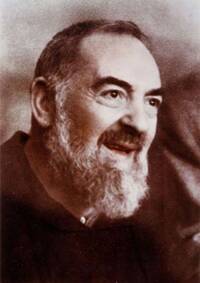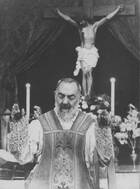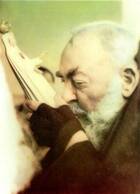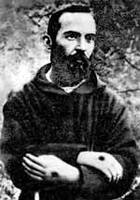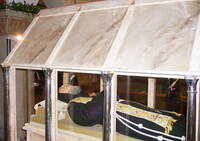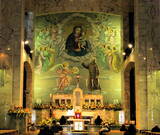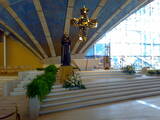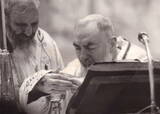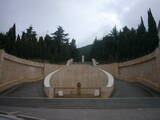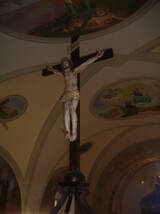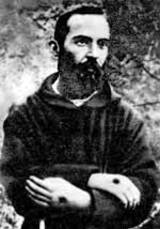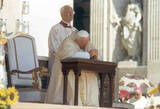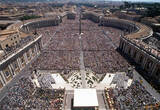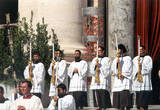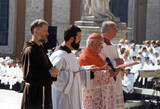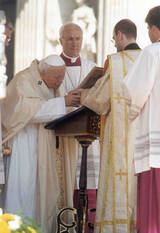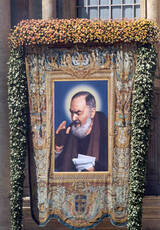Saint Padre Pio of Pietrelcina
Capuchin priest (OFM Cap) - from Italy
Suffered the stigmata and drew many back to their faith through the confessional.
Born Francesco Forgione in Pietrelcina on 25 May 1887
Died in San Giovanni Rotondo, Foggia, on 23 September 1968. Beatified on 2 May 1999 & canonized on 16 June 2002 by St John Paul II
Major shrine: San Giovanni Rotondo (where he's buried)
Feast Day - 23rd September
Padre Pio: "Prayer is the best weapon we possess, the key that opens the heart of God."
"My past, O Lord, to your mercy; my present, to your love; my future, to your providence!"
3 2us by Fr Emmanuel Mansford CFR ![]()
"He was truly a priest. As Pope John Paul said, 'A man for others'.. He was a man truly configured to Christ."
Novena to St Pio of Pietrelcina
This Totus2us novena to Padre Pio has a different prayer each day followed by the novena prayer Padre Pio prayed to the Sacred Heart of Jesus each day for the intentions of all those who had asked for his prayers. The music is by Edwin Fawcett.
Click here for more.
Day 1 ![]() - Day 2
- Day 2 ![]() - Day 3
- Day 3 ![]() - Day 4
- Day 4 ![]() -
-
Day 5 ![]() - Day 6
- Day 6 ![]() - Day 7
- Day 7 ![]() - Day 8
- Day 8 ![]() - Day 9
- Day 9 ![]()
Niall, from England, chose Padre Pio on The Incredibles ![]()
"When I was growing up I had a lot of fear in my heart and, because for me it was normal, I didn't realise it could be any different. But as I started to pray I started to realise that God didn't want that, I remember I came across something that Padre Pio had said: 'Fear is a greater evil than evil itself.' In other words it's fear that stops us from being alive, it's fear that stops us from really enjoying the life that God has given us. And I always remember the words 'He is a good friend' because I really believe the saints aren't just people for us to admire and imitate, they're much more than that, they are actually friends and we shouldn't be afraid to speak to them like we would to a friend. And the love they have for us is so warm and so sincere and so compassionate .. For me, Padre Pio would be that, like a friend, I know that I can ask him for help, and I know that he is someone who suffered and who understands. He said a beautiful thing to his spiritual children: that when he got to heaven, he wouldn't go in, he'd hold the door open for them."
Xanthe, from England ![]()
"I was going through a very, very stressful period in my life where God was leading me to do some really quite challenging things which needed to happen to change my life and I had an incredibly powerful dream of Padre Pio. ... I remember waking up absolutely flooded with comfort and love."
Mariam, 25 & half Egyptian, half Lebanese/Iraqi ![]()
"Padre Pio really gives me hope even when we are hopeless. And he always said ‘Pray, hope and don’t worry. God is merciful and He will hear your prayer.” So I always carry these words with me and I remember them whenever I feel like my life is a bit torn. So those are miraculous words really for the heart and I hope you can take them with you as well: 'Pray, hope and don't worry. God is merciful and He will hear your prayer.'""
Joshua, from Singapore was a pilgrim to San Giovanni Rotondo ![]()
"I think what I remember most about the pilgrimage to San Giovanni Rotondo was seeing St Pio's cell and visiting the place where his body lay. It gave me a reminder of how even the saints, who have our devotions and we ask them to pray for us and intercede for us and we know that they are in heaven, it was a reminder that they were also human and facing the same challenges just as us, subject to the same weaknesses and temptations and challenges. So it gave me hope that, even though in the day to day struggles we can fall, sometimes it's difficult, I know that ultimately, by God's grace, that we can make it, that we can be saved, because the saints were in the same place as we are in."
Papa St John Paul II's Homily at Padre Pio's Beatification
St Peter's Square, Sunday, 2 May 1999 - in English, French, German, Italian, Portuguese & Spanish
“Sing a new song to the Lord!”
"1. The summons of the entrance antiphon captures well the joy of so many of the faithful who have long awaited the beatification of Padre Pio of Pietrelcina. By his life given wholly to prayer and to listening to his brothers, this humble Capuchin friar astonished the world.
Countless people came to meet him in the friary of San Giovanni Rotondo and, since his death, the flow of pilgrims has not ceased. When I was a student here in Rome, I myself had the chance to meet him personally, and I thank God for allowing me today to enter Padre Pio's name in the book of the blessed.
Guided by the texts of this 5th Sunday of Easter, which provides the context for the beatification, let us this morning trace the main features of his spiritual experience.
2. “Do not let your hearts be troubled. Believe in God and believe also in me” (Jn 14:1). In the Gospel just proclaimed, we heard these words of Jesus to his disciples who were in need of encouragement. In fact, his allusion to his imminent departure had thrown them into turmoil. They were afraid of being abandoned, of being alone, and the Lord consoled them with a very specific promise: “I am going to prepare a place for you”, and then, “I will come again and will take you to myself, that where I am you may be also” (Jn 14:2-3).
Through Thomas, the Apostles reply to this reassurance: “Lord, we do not know where you are going; how can we know the way?” (Jn 14:5). The remark is apt, and Jesus does not avoid the question which it implies. The answer he gives will remain for ever a light shining for generations still to come: “I am the way and the truth and the life; no one comes to the Father except through me” (Jn 14:6).
The “place” that Jesus goes to prepare is in “the house of the Father”; there the disciple will be able to be with the Master for all eternity and share in his joy. Yet there is only one path that leads there: Christ, to whom the disciple must be conformed more and more. Holiness consists precisely in this: that it is no longer the Christian who lives, but Christ himself who lives in him (cf Gal 2:20). An exhilarating goal, accompanied by a promise which is no less consoling: “Whoever believes in me will also do the works that I do, and greater works than I will they do, because I am going to the Father” (Jn 14:12).
3. We hear these words of Christ and think of the humble friar of Gargano. How clearly were they fulfilled in Bl. Pio of Pietrelcina!
“Do not let your hearts be troubled. Believe ...”. What was the life of this humble son of St Francis if not a constant act of faith, strengthened by the hope of heaven, where he could be with Christ?
“I am going to prepare a place for you ... that where I am you may be also.” What other purpose was there for the demanding ascetical practices which Padre Pio undertook from his early youth, if not gradually to identify himself with the Divine Master, so that he could be “where he was”?
Those who went to San Giovanni Rotondo to attend his Mass, to seek his counsel or to confess to him, saw in him a living image of Christ suffering and risen. The face of Padre Pio reflected the light of the Resurrection. His body, marked by the “stigmata”, showed forth the intimate bond between death and resurrection which characterizes the paschal mystery. Bl. Pio of Pietrelcina shared in the Passion with a special intensity: the unique gifts which were given to him, and the interior and mystical sufferings which accompanied them, allowed him constantly to participate in the Lord's agonies, never wavering in his sense that “Calvary is the hill of the saints”.
4. No less painful, and perhaps even more distressing from a human point of view, were the trials which he had to endure as a result, it might be said, of his incomparable charisms. It happens at times in the history of holiness that, by God's special permission, the one chosen is misunderstood. In that case, obedience becomes for him a crucible of purification, a path of gradual assimilation to Christ, a strengthening of true holiness. In this regard, Bl. Pio wrote to one of his superiors: “I strive only to obey you, the good God having made known to me the one thing most acceptable to him and the one way for me to hope for salvation and to sing of victory” (Letter I, p. 807).
When the “storm” broke upon him, he took as his rule of life the exhortation of the First Letter of Peter, that we have just heard: Come to Christ, a living stone (cf 1 Pt 2:4). He himself thus became a “living stone” for the building of that spiritual house which is the Church. For this we today give thanks to the Lord.
5. “You too are living stones, built into a spiritual house” (1 Pt 2:5). How fitting are these words if we apply them to the extraordinary ecclesial experience which grew up around the new blessed! So many people, meeting him directly or indirectly, rediscovered their faith; inspired by his example, “prayer groups” sprang up in every corner of the world. To all who flocked to him he held up the ideal of holiness, repeating to them: “It seems that Jesus has no interest outside of sanctifying your soul” (Letter II, p 155).
If divine Providence willed that he should be active without ever leaving his convent, as though he were “planted” at the foot of the Cross, this is not without significance. One day the Divine Master had to console him, at a moment of particular trial, by telling him that “it is under the Cross that one learns to love” (Letter I, p 339).
Yes, the Cross of Christ is truly the outstanding school of love; indeed, the very “well-spring” of love. Purified by suffering, the love of this faithful disciple drew hearts to Christ and to his demanding Gospel of salvation.
6. At the same time, his charity was poured out like balm on the weaknesses and the sufferings of his brothers and sisters. Padre Pio thus united zeal for souls with a concern for human suffering, working to build at San Giovanni Rotondo a hospital complex which he called the “House for the Relief of Suffering”. He wanted it to be a first-class hospital, but above all he was concerned that the medicine practised there would be truly “human”, treating patients with warm concern and sincere attention. He was quite aware that people who are ill and suffering need not only competent therapeutic care but also, and more importantly, a human and spiritual climate to help them rediscover themselves in an encounter with the love of God and with the kindness of their brothers and sisters.
With the “House for the Relief of Suffering”, he wished to show that God's “ordinary miracles” take place in and through our charity. We need to be open to compassion and to the generous service of our brothers and sisters, using every resource of medical science and technology at our disposal.
7. The echo stirred by this beatification in Italy and throughout the world shows that the fame of Padre Pio, a son of Italy and of Francis of Assisi, has gone forth to embrace all the continents. And I gladly greet those who have gathered here — in the first place the Italian authorities who have chosen to be present: the President of the Republic, the President of the Senate, the Prime Minister, who leads the official delegation, and the many other ministers and distinguished guests. Italy is represented most worthily! But also the many faithful from other nations have gathered here to pay homage to Padre Pio.
My affectionate greeting goes to all who have come from near and far, with a special thought for the Capuchin Fathers. To everyone I offer heartfelt thanks.
8. Let me conclude with the words of the Gospel of this Mass: “Do not let your hearts be troubled. Have faith in God.” There is a reference to this exhortation of Christ in the advice which the new blessed never tired of giving to the faithful: “Abandon yourselves fully to the divine heart of Jesus, like a child in the arms of his mother”. May these words of encouragement fill our hearts too and become a source of peace, serenity and joy. Why should we fear, if Christ for us is the Way, and the Truth and the Life? Why should we not trust in God who is the Father, our Father?
May “Our Lady of Graces”, whom the humble Capuchin of Pietrelcina invoked with constant and tender devotion, help us to keep our gaze fixed on God. May she take us by the hand and lead us to seek wholeheartedly that supernatural charity flowing forth from the wounded side of the Crucified One.
And you, Bl. Padre Pio, look down from heaven upon us assembled in this square and upon all gathered in prayer before the Basilica of St John Lateran and in San Giovanni Rotondo. Intercede for all those who, in every part of the world, are spiritually united with this event and raise their prayers to you. Come to the help of everyone; give peace and consolation to every heart. Amen!"
Papa St John Paul II's address to Pilgrims after Padre Pio's beatification
St Peter's Square, Monday 3 May 1999 - in English, German, Italian, Portuguese & Spanish
"Dear Brothers and Sisters,
1. It is a great joy for me to meet you again in this square which yesterday witnessed an event you waited so long for: the beatification of Padre Pio of Pietrelcina. Today is the day of thanksgiving.
The solemn Eucharistic celebration, at which Cardinal Angelo Sodano, my Secretary of State, presided, ended a short while ago. I offer him a cordial greeting, which I extend to each of the other Cardinals and Bishops present, as well as to the many priests and faithful taking part.
Dear Capuchin Friars, I embrace you with special affection, as I do the other members of the great Franciscan family who are praising the Lord for the marvels he worked in the humble friar of Pietrelcina, an exemplary follower of the Poor Man of Assisi.
Many of you, dear pilgrims, are members of prayer groups founded by Padre Pio: I greet you affectionately together with all the other faithful who, prompted by their devotion to the new blessed, have wished to be here on this joyful occasion. Lastly, I would like to extend a special greeting to all the sick: you were dear to Padre Pio's heart and work; thank you for your treasured presence!
2. Divine Providence wanted Padre Pio to be beatified on the eve of the Great Jubilee of the Year 2000, as a dramatic century draws to a close. What is the message that the Lord would like to offer to believers and to all humanity with this event of major spiritual importance?
Padre Pio's witness, which is evident from his life and even from his physical condition, suggests to us that this message coincides with the essential meaning of the Jubilee now close at hand: Jesus is the one Saviour of the world. In him God's mercy was made flesh in the fullness of time, to bring salvation to humanity mortally wounded by sin. “By his wounds you have been healed” (1 Pt 2, 24), the blessed father repeated to all in the words of the Apostle Peter, he whose body was marked with those wounds.
In 60 years of religious life, practically all spent at San Giovanni Rotondo, he was totally dedicated to prayer and to the ministry of reconciliation and spiritual direction. This was well emphasized by the Servant of God Pope Paul VI: “Look what fame he had.... But why?... Because he said Mass humbly, heard confessions from dawn to dusk and was ... the one who bore the wounds of our Lord. He was a man of prayer and suffering” (20 February 1971).
Totally absorbed in God, always bearing the marks of Jesus' Passion in his body, he was bread broken for men and women starving for God the Father's forgiveness. His stigmata, like those of Francis of Assisi, were the work and sign of divine mercy, which redeemed the world by the Cross of Jesus Christ. Those open, bleeding wounds spoke of God's love for everyone, especially for those sick in body and spirit.
3. And what can be said of his life, an endless spiritual combat, sustained by the weapons of prayer, centred on the sacred daily acts of Confession and Mass? Holy Mass was the heart of his whole day, the almost anxious concern of all his hours, his moment of closest communion with Jesus, Priest and Victim. He felt called to share in Christ's agony, an agony which continues until the end of the world.
Dear friends, in our time, when we are still under the illusion that conflicts can be resolved by violence and superior strength, and frequently give in to the temptation to abuse the force of arms, Padre Pio repeats what he once said: “What a dreadful thing war is! In every person wounded in the flesh, there is Jesus suffering.” Nor should we fail to note that both his works — the “House for the Relief of Suffering” and the prayer groups — were conceived by him in 1940, as the catastrophe of the Second World War loomed in Europe. He was not idle, but from his secluded friary in Gargano he responded with prayer, works of mercy and love for God and neighbour. And today, from heaven, he is telling everyone again that this is the authentic way of peace.
4. The prayer groups and the “House for the Relief of Suffering”: these are two significant “gifts” which Padre Pio has left us. Conceived and desired by him as a hospital for the sick poor, the “House for the Relief of Suffering” was planned from the start as a health-care facility open to everyone, but this was no reason for it to be less equipped than other hospitals. Indeed, Padre Pio wanted it to have the most advanced scientific and technological equipment, so that it would be a place of authentic hospitality, loving respect and effective treatment for every suffering person. Is it not a true miracle of Providence that it continues to grow in accordance with its founder's spirit?
As for the prayer groups, he wanted them to be like beacons of light and love in the world. He longed for many souls to join him in prayer: “Pray”, he used to say, “pray to the Lord with me, because the whole world needs prayers. And every day, when your heart especially feels the loneliness of life, pray, pray to the Lord together, because God too needs our prayers!” It was his intention to create an army of praying people who would be a “leaven” in the world by the strength of prayer. And today the whole Church is grateful to him for this precious legacy, admires the holiness of her son and invites everyone to follow his example.
5. Dear brothers and sisters, Padre Pio's witness is a powerful call to the supernatural dimension, not to be confused with exaggerated concern for miracles, a deviation which he always and resolutely shunned. Priests and consecrated persons in particular should look to him.
He teaches priests to become the docile and generous instruments of divine grace, which heals people at the root of their ills, restoring peace of heart to them. The altar and the confessional were the two focal points of his life: the charismatic intensity with which he celebrated the divine mysteries is a very salutary witness, to shake priests from the temptation of habit and help them rediscover, day by day, the inexhaustible treasure of spiritual, moral and social renewal which is placed in their hands.
To consecrated persons and especially to the Franciscan family, he offers a witness of extraordinary fidelity. Francis was his baptismal name, and he was a worthy follower of the Seraphic Father in poverty, chastity and obedience from the time he first entered the friary. He practised the Capuchin rule in all its rigour, generously embracing the life of penance. He found no gratification in pain but chose it as a way of expiation and purification. Like the Poor Man of Assisi, he aimed at conformity with Jesus Christ, desiring only “to love and to suffer”, in order to help the Lord in the exhausting and demanding work of salvation. In “firm, constant and iron” obedience (Letter I, p 488), he found the highest expression of his unconditional love for God and the Church.
What a consolation to feel we have Padre Pio close to us, one who only wanted to be “a poor friar who prays”: a brother of Christ, a brother of Francis, a brother of the suffering, a brother of each one of us. May his help guide us on the way of the Gospel and make us ever more generous in following Christ!
May the Blessed Virgin Mary, whom he loved and helped others to love with profound devotion, obtain this for us. May his intercession, which we confidently invoke, obtain this for us.
I accompany these hopes with my Apostolic Blessing, which I cordially impart to you, dear pilgrims present here, and to all who are united in spirit with our festive gathering."
Pope St John Paul II's homily at Padre Pio's Canonization
St Peter's Square, Sunday, 16 June 2002 - in English, French, German, Italian, Portuguese & Spanish
1. "For my yoke is easy and my burden light" (Mt 11,30).
"Jesus' words to his disciples, which we just heard, help us to understand the most important message of this solemn celebration. Indeed, in a certain sense, we can consider them as a magnificent summary of the whole life of Padre Pio of Pietrelcina, today proclaimed a saint.
The evangelical image of the "yoke" recalls the many trials that the humble Capuchin of San Giovanni Rotondo had to face. Today we contemplate in him how gentle the "yoke" of Christ is, and how truly light is his burden when it is borne with faithful love. The life and mission of Padre Pio prove that difficulties and sorrows, if accepted out of love, are transformed into a privileged way of holiness, which opens onto the horizons of a greater good, known only to the Lord.
2. "But may I never boast except in the cross of Our Lord Jesus Christ" (Gal 6,14).
Is it not, precisely, the "glory of the Cross" that shines above all in Padre Pio? How timely is the spirituality of the Cross lived by the humble Capuchin of Pietrelcina. Our time needs to rediscover the value of the Cross in order to open the heart to hope.
Throughout his life, he always sought greater conformity with the Crucified, since he was very conscious of having been called to collaborate in a special way in the work of redemption. His holiness cannot be understood without this constant reference to the Cross.
In God's plan, the Cross constitutes the true instrument of salvation for the whole of humanity and the way clearly offered by the Lord to those who wish to follow him (cf. Mk 16,24). The Holy Franciscan of the Gargano understood this well, when on the Feast of the Assumption in 1914, he wrote: "In order to succeed in reaching our ultimate end we must follow the divine Head, who does not wish to lead the chosen soul on any way other than the one he followed; by that, I say, of abnegation and the Cross" (Epistolario II, p. 155).
3. "I am the Lord who acts with mercy" (Jer 9,23).
Padre Pio was a generous dispenser of divine mercy, making himself available to all by welcoming them, by spiritual direction and, especially, by the administration of the sacrament of Penance. I also had the privilege, during my young years, of benefitting from his availability for penitents. The ministry of the confessional, which is one of the distinctive traits of his apostolate, attracted great crowds of the faithful to the monastery of San Giovanni Rotondo. Even when that unusual confessor treated pilgrims with apparent severity, the latter, becoming conscious of the gravity of sins and sincerely repentant, almost always came back for the peaceful embrace of sacramental forgiveness.
May his example encourage priests to carry out with joy and zeal this ministry which is so important today, as I wished to confirm this year in the Letter to Priests on the occasion of Holy Thursday.
4. "You, Lord, are my only good".
This is what we sang in the responsorial psalm. Through these words, the new Saint invites us to place God above everything, to consider him our sole and highest good.
In fact, the ultimate reason for the apostolic effectiveness of Padre Pio, the profound root of so much spiritual fruitfulness can be found in that intimate and constant union with God, attested to by his long hours spent in prayer and in the confessional. He loved to repeat, "I am a poor Franciscan who prays" convinced that "prayer is the best weapon we have, a key that opens the heart of God". This fundamental characteristic of his spirituality continues in the "Prayer Groups" that he founded, which offer to the Church and to society the wonderful contribution of incessant and confident prayer. To prayer, Padre Pio joined an intense charitable activity, of which the "Home for the Relief of Suffering" is an extraordinary expression. Prayer and charity, this is the most concrete synthesis of Padre Pio's teaching, which today is offered to everyone.
5. "I bless you, Father, Lord of heaven and earth, because ... these things ... you have revealed to little ones" (Mt 11,25).
How appropriate are these words of Jesus, when we think of them as applied to you, humble and beloved Padre Pio.
Teach us, we ask you, humility of heart so we may be counted among the little ones of the Gospel, to whom the Father promised to reveal the mysteries of his Kingdom.
Help us to pray without ceasing, certain that God knows what we need even before we ask him.
Obtain for us the eyes of faith that will be able to recognize right away in the poor and suffering the face of Jesus.
Sustain us in the hour of the combat and of the trial and, if we fall, make us experience the joy of the sacrament of forgiveness.
Grant us your tender devotion to Mary, Mother of Jesus and our Mother.
Accompany us on our earthly pilgrimage toward the blessed homeland, where we hope to arrive in order to contemplate forever the glory of the Father, the Son and the Holy Spirit. Amen."
St Pio de Pietrelcina (AP; CE 47)
True humility of heart is more easily felt and lived than externalised. Naturally, we should always show ourselves humble in God’s presence, but not with the false humility that only leads to discouragement, despondency and despair. We should have a low estimation of ourselves, not put our own interests before those of others and reckon ourselves of less importance than our neighbour.
If we need patience to bear with other people’s troubles, we need even more to learn how to support our own. Faced with your daily infidelities, make acts of humility constantly. When the Lord sees you practising repentance in this way, he will stretch out his hand towards you and draw you to himself.
Nobody merits anything in this world; it is the Lord who grants us everything out of sheer kindness and because, in his infinite goodness, he forgives all things.
Padre Pio (Ep 3, 980; GF, 196f):
Be patient and persevere in the practice of meditation. Be content, to start with, to make progress only by degrees. Later on you will have legs that will ask for nothing but to run or, better, wings for flying with.
Be happy to obey. It's never easy but it is God we have chosen as our portion. Accept that, as yet, you are only a little bee in its nest but, very quickly, it will become one of those wonderful workers so skilful in making honey. Always remain humble before God and men, in love. Then our Lord will speak to you in truth and enrich you with his gifts.
It can happen that bees will cover great distances over the meadows before they find the flowers they want. Afterwards, worn out but satisfied and laden with pollen, they go back to the hive to carry out the silent but fruitful transformation of the flowers' nectar into the nectar of life. You, do likewise: when you have listened to the Word, meditate on it attentively, study its different aspects, seek out the depths of its meaning. Then it will become clear and luminous to you; it will have power to transform your natural inclinations into a pure uplifting of the spirit, and your heart will be always more closely united to the heart of Christ.

